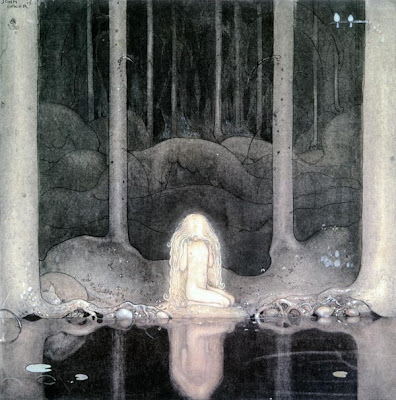 Aili and I just returned from a brief jaunt to Montreal, primarily to see Radiohead play at the Parc Jean Drapeau. I admit to having steadily lost interest in live shows as I've grown older - in part because of absurd ticket costs, but mostly because the bands I am most motivated to see (Tool, Radiohead, Beck, etc.) are all big-stadium draws now. And there's only so much enjoyment I can get out of watching the silhouette of Thom Yorke, or Maynard or whomever, do something not quite discernible from a long ways away. Plus, I've always been one of those concert-goers who closes their eyes through a lot of the songs, just so that I can absorb the music a little more fully. One eventually begins to wonder why you're standing in the mud along with 30,000 idiots who, for some reason, feel it necessary to sing along with every song even though their voice makes you want to club baby seals.
Aili and I just returned from a brief jaunt to Montreal, primarily to see Radiohead play at the Parc Jean Drapeau. I admit to having steadily lost interest in live shows as I've grown older - in part because of absurd ticket costs, but mostly because the bands I am most motivated to see (Tool, Radiohead, Beck, etc.) are all big-stadium draws now. And there's only so much enjoyment I can get out of watching the silhouette of Thom Yorke, or Maynard or whomever, do something not quite discernible from a long ways away. Plus, I've always been one of those concert-goers who closes their eyes through a lot of the songs, just so that I can absorb the music a little more fully. One eventually begins to wonder why you're standing in the mud along with 30,000 idiots who, for some reason, feel it necessary to sing along with every song even though their voice makes you want to club baby seals.
But it speaks to Radiohead's brilliance that, even through the idiocy of the crowd, and the bullheaded security guys who kept trying to kick us off the stairs where we had a good view of the show, and the light drizzle that kept up for nearly 3 hours, their music sang clear and true and touched us both. Here's the set-list, in case you want to load up an identical playlist in Itunes:
01. 15 Step
02. There There
03. Morning Bell (*not sure about this one*)
04. All I Need
05. My Iron Lung
06. Nude
07. Weird Fishes/Arpeggi
08. The Gloaming
09. The National Anthem
10. Fake Plastic Trees
11. Reckoner
12. Like Spinning Plates
13. Jigsaw Falling Into Place
14. Lucky
15. Optimistic
16. Idioteque
17. Bodysnatchers
Encore 1
18. Faust Arp
19. Videotape
20. Paranoid Android
21. Bangers and Mash
22. Karma Police
Encore 2
23. House of Cards
24. You And Whose Army?
25. Everything In Its Right Place
I think I'm correct in saying that all of
In Rainbows was covered (but only
Bangers & Mash off the "B-sides" CD). I was actually surprised at the number of old classics that were played, including
Paranoid Android &
Karma Police off of
OK Computer, and (both highlights for me)
My Iron Lung &
Fake Plastic Trees from
The Bends.
National Anthem was fucking brilliant, of course, and
The Gloaming made my skin crawl. Other surprises:
You and Whose Army?, which is a great song but odd to play in a live set, and another experimental track off of
Amnesiac,
Like Spinning Plates.
For a large segment of the show, fireworks were going off nearby that, oddly enough, had nothing to do with the concert. This pleased both Aili and me greatly, although at one point Thom commented how he wished they would have saved them for the end. There is no doubt that
Radiohead gives you a complete experience - even when I saw them in Santa Barbara back in '01, I remember being impressed by how long they entertained us peons.
The light show was exquisite, and perhaps our distance from the stage gave us a nice perspective. Here's a pic that I blatantly stole from some guy's Flickr site (thank you Maczag):
I know I'm not alone in my love of
Radiohead. Every time I listen to them, I can't help but feel that they're the most thoroughly
modern band out there. They are of
our time. If a host of alien invasion ships appeared tomorrow, hovering over our major cities threatening absolute annihilation unless we can somehow convince them of our worth in the universe - I would send them some
Radiohead CD's. There is no doubt in my mind that they'd leave us be, to wallow in our own collective fate.
While you make pretty speeches,
I'm being cut to shreds
You feed me to the lions,
a delicate balance
And this just feels like spinning plates
I'm living in cloud cuckoo land
And this just feels like spinning plates
My body is floating down the muddy river

 Neill is a fine example of Golden Age illustration, and he is in good company. As book printing techniques advanced during that era, illustrators were able to take more liberties with color and style, and the public responded with enthusiasm. How could they not? Look at some of the classic works of the era:
Neill is a fine example of Golden Age illustration, and he is in good company. As book printing techniques advanced during that era, illustrators were able to take more liberties with color and style, and the public responded with enthusiasm. How could they not? Look at some of the classic works of the era:










.jpg)










